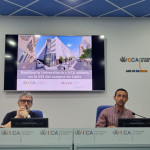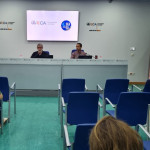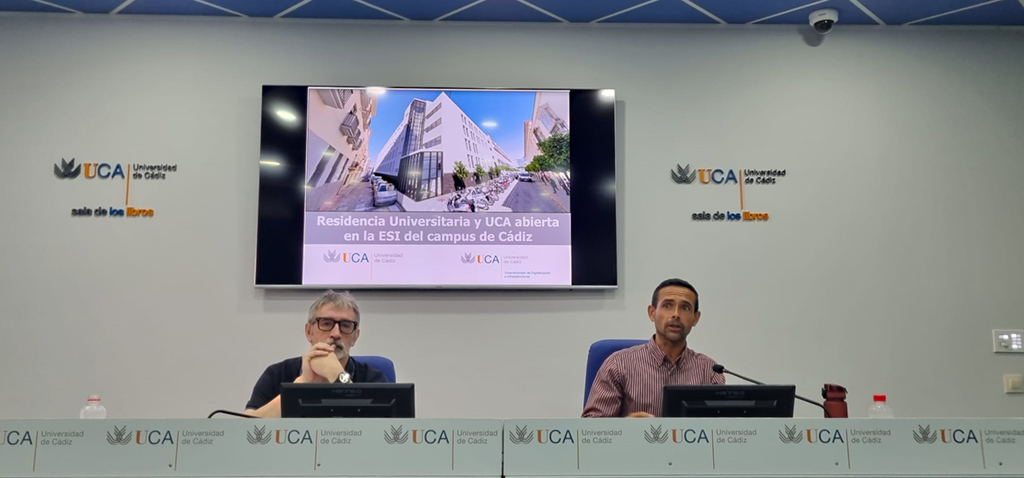The rector of the UCA presents the preliminary project for the university residence and open cultural centre in the building of the former ESI of Cádiz 26 July 2022
This is a unique case of public-private collaboration. Published today in the BOJA, it has the approval of the Governing Council and the Social Council of the UCA.
The rector of the University of Cadiz, Francisco Piniella, accompanied by the vice-rector for Digitalisation and Infrastructures, Carlos Rioja, today presented the preliminary project for the new university residence and open cultural centre in the building of the former School of Engineering on the Cadiz Campus. It is “an initiative that forms part of the strategy to strengthen the UCA on its four campuses and is included in its own plan to improve its infrastructures”.
This preliminary project, whose announcement is published today in the BOJA, constitutes, in the words of the rector, “a particularly relevant action in the configuration and design of the Cadiz Campus of the UCA on which we have been working for months. It is part of a strategic policy of reinforcement and improvement of the university infrastructures of the UCA” through two priority lines of action: the rehabilitation, remodelling and improvement of university buildings (as is the case of the new Rectorate in the Reina Sofia Cultural Centre, the Student House, the Multipurpose Building or the faculties of Economic and Business Sciences, Medicine and Labour Sciences) and, on the other hand, the construction of new infrastructures (such as the second lecture hall in Jerez or the UCA-SEA R+D+i centre on the land ceded by the Port of Algeciras in Llano Amarillo, already under construction).
Francisco Piniella recalled that “my team’s government programme for these four years included the UCA Abierta project. An initiative that emphasises the significant role of the UCA in revitalising the cultural agenda of the area in connection with the citizens. Today we are one step closer to materialising this ambitious proposal. With it, we want to reinforce our role as a cultural engine, as an institution that stimulates the cultural agenda of the province. And for this, “it was necessary to have a meeting point, a space for connection and exchange. This is what the UCA Open Cultural Centre, which includes this preliminary project, is all about”.
For his part, Carlos Rioja commented that “as a Cadiz citizen and engineer, this is a very special day”. The former headquarters of the School of Engineering will continue to be UCA heritage, highlighting the good conservation of its structure and the revaluation of the UCA buildings.
Thus, after the proposal processed by the Vice-Rectorate for Digitalisation and Infrastructures of the UCA, based on the working meetings with different investment companies, the UCA Contracting Service has already started the compulsory public information process for the preliminary project of the University Residence and UCA Open Cultural Centre in the building of the former ESI on the Campus of Cádiz. This is a unique case of public-private collaboration in relation to a building that has been unused since 2014, which was even decommissioned and which the UCA is now recovering for the city. Two objectives are materialised in one: the provision of a university residence for a growing campus in a city with enormous difficulty for student accommodation and, on the other hand, with the creation and use of an open cultural centre which, according to the rector of the UCA, “we want to turn it into a kind of “Casa Encendida” for the city of Cadiz.
To this end, over the last year the Vice-Rectorate for Digitalisation and Infrastructures of the University of Cadiz has held meetings with various companies interested in investing in this initiative. This series of working meetings has led to an investor company presenting a project for the building in accordance with the priority policies and the shared use model established by the UCA. In this way, one part of the building (the residence) will be privately managed and the other (the open cultural centre) will be managed by the UCA and its use will be open to the public.
Specifically, the Vice-rectorate for Digitalisation and Infrastructures, as is mandatory in this type of case, has drawn up a detailed and reasoned report on the change of use of the building: from a university academic centre to a university residence and cultural centre. A documentation that, on the other hand, includes the excellent state of conservation of the structure of the building so that the action can be carried out without constructive problems and that, before the beginning of the public processing of the preliminary project, has the support and approval of both the Governing Council and the Social Council of the UCA.
With the public exhibition of the preliminary project, a period of two months is opened for the presentation of allegations from its publication today in the BOJA (Official Gazette of the Andalusian Government). In this way, the private initiative for the concession of works for a student residence in the building of the former ESI in Cadiz, including shared areas and areas for exclusive use of the UCA, will be processed. This formal step initiates the public information process, as well as the respective preliminary project of works and involves the exhibition of the documents relating to the feasibility study and the preliminary project for the concession of works presented, in this case, by the company Urban Roll.
Once the period of public exhibition and reception of allegations is over, the UCA Management and Contracting, as a priority, plan to prepare the public tender documents for the project with the forecast of having them prepared and published by the end of this year 2022 so that, following all the steps of the procedure, the works can start at the end of 2023 or early 2024. For this reason, Francisco Piniella wanted to “give special thanks to the work of the Vice-rectorate for Digitalisation and Infrastructures, Management and the Contracting and Economic Management services of the UCA for the onerous processing involved in each project”.
Once the tendering process has been completed, the University of Cadiz, owner of the building, will award by public tender the rehabilitation of the building for its subsequent shared use: University Residence (private company) and Open Cultural Centre (UCA). The procedure envisages an administrative concession for the use of part of the building for a period of 40 years (+ 10) in favour of the investing company. For its part, the company is responsible for the execution and 100% financing of the entire project. Once the works have been completed, it will enjoy the use and management as a university residence of the corresponding part for the estimated time, while the UCA will have a space suitable for its plan of activities for the implementation of its Open Cultural Centre. The preliminary project also contemplates a series of shared-use spaces on the ground floor: courtyard and open-air indoor parking, assembly hall, lobby, reception and cafeteria.
Open Cultural Center
The UCA Open Cultural Centre will have three floors that will harmoniously integrate different spaces for multiple cultural uses: exhibitions, concerts, cinema, theatre, training workshops, presentations, debates, courses, rehearsal space, etc. This new infrastructure will complement and reinforce the potential of the Constitución 1812 building, the epicentre of UCA cultural action.
All the spaces of the future UCA Open Cultural Centre in the old ESI building can be used by the citizens for the development of cultural activities. In a first approximate general description, the ground floor would house the foyer and the assembly hall (both of which would be shared with the university residence). On the first, second and third floors, different cultural spaces will be distributed: exhibition hall and spaces for presentations, training workshops, courses, meetings, rehearsal rooms, etc.
In principle, the University of Cadiz could transfer the activity of its different training schools (Modern Music and Jazz, Theatre Training School, Film School, Dance School, Photography School, Flamenco School and Club de las Letras), as well as the UCA Choir and the various theatre groups, to these new spaces.
In any case, as the rector pointed out, this boost to UCA infrastructures “is not an end in itself. It is a means to serve both the university community and society in general. As a public university, all the centres on our four campuses form a network of public buildings at the service of society”. A strategic and priority line of action where “we are making the most of all the options for the growth and improvement of our infrastructures. We are exploring all the possibilities for improving our campuses and responding to the needs that we are detecting in terms of infrastructures”.




